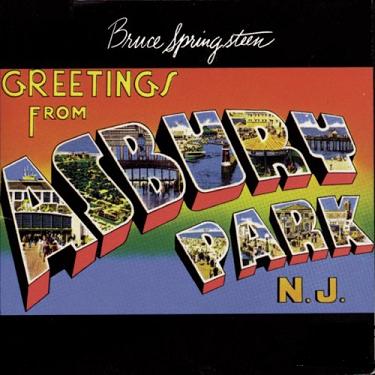
Greetings From Asbury Park, N.J. (1974)

1. Blinded By the Light
2. Growin' Up
3. Mary Queen of Arkansas
4. Does This Bus Stop at 82nd Street
5. Lost in the Flood
6. Angel
7. For You
8. Spirit in the Night
9. It's Hard to be a Saint in the City
With his debut album, Greetings from Asbury Park, N.J., Bruce Springsteen announced himself as a formidable songwriter—one already well-versed in the possibilities of lyricism and myth-making, even at the age of twenty-two. Much like Bob Dylan a decade before him, Springsteen arrived as a literary force disguised as a rock musician. And while comparisons to Dylan were rife at the time (largely due to the torrent of words tumbling from Springsteen’s pen), his vision was unmistakably his own.
Where Dylan’s early output channeled the introspective melancholy of folk traditions and political unrest, Springsteen’s early narratives emerged from the cracked sidewalks of working-class towns. These were songs of hotwired youth, of evenings spent in the front seats of battered Chevys, of lives balanced between the poetry of aspiration and the gravity of circumstance. His protagonists rarely reached escape velocity—but they always revved the engine.
The album is, above all, a writer’s record. On tracks like Blinded by the Light and Mary Queen of Arkansas, the lyrics cascade in surrealist waves—dense, alliterative, at times bewildering. Yet even in their opaqueness, they carry a sense of lived-in vitality. Springsteen was still discovering how to discipline his language, but the energy is unmistakable. There is no mistaking the joy he takes in sheer expression.
Musically, the record is a modest affair. The E Street Band, in its early iteration, had yet to achieve the sonic enormity of later years, but even here one hears the first hints of their cohesion and stylistic range. The arrangements lean toward folk-rock and piano-driven balladry rather than stadium anthems, but there is no shortage of emotional heft. Lost in the Flood and Does This Bus Stop at 82nd Street? are less songs than vignettes, staged with cinematic intensity.
The album cover—an ironic postcard image bearing a cheerful message from a not-so-cheerful shore—is deceptive. Far from the sun-drenched boardwalks it suggests, the album’s heart lies in rain-slicked streets and diners on the edge of town. Still, it is not a record of bitterness. Rather, it brims with youthful longing and unjaded belief in the redemptive power of love, escape, and rock and roll itself.
In retrospect, Greetings from Asbury Park, N.J. is a remarkably assured opening salvo. The themes Springsteen would explore more deeply in subsequent albums—disillusionment, resilience, and the quiet dignity of ordinary lives—are already present here, albeit in more chaotic form. It is not yet the fully formed voice of Born to Run or Darkness on the Edge of Town, but the foundation is unmistakable. A debut rich with promise, and more than a few moments of greatness.
Go back to the main page
Go To Next Review